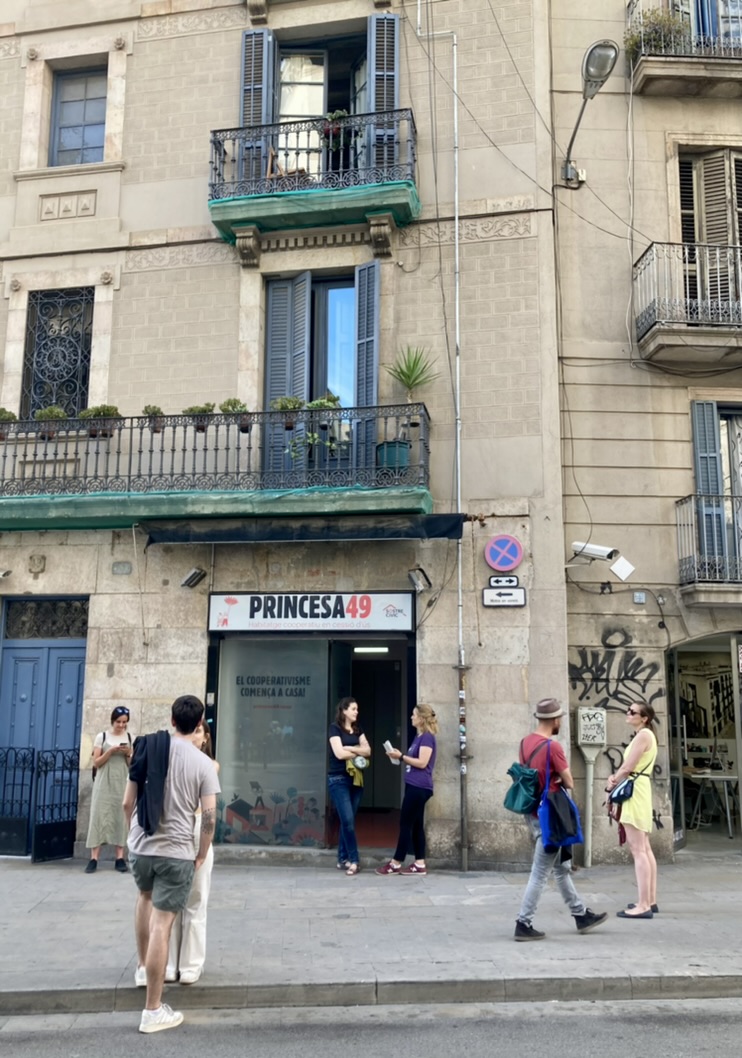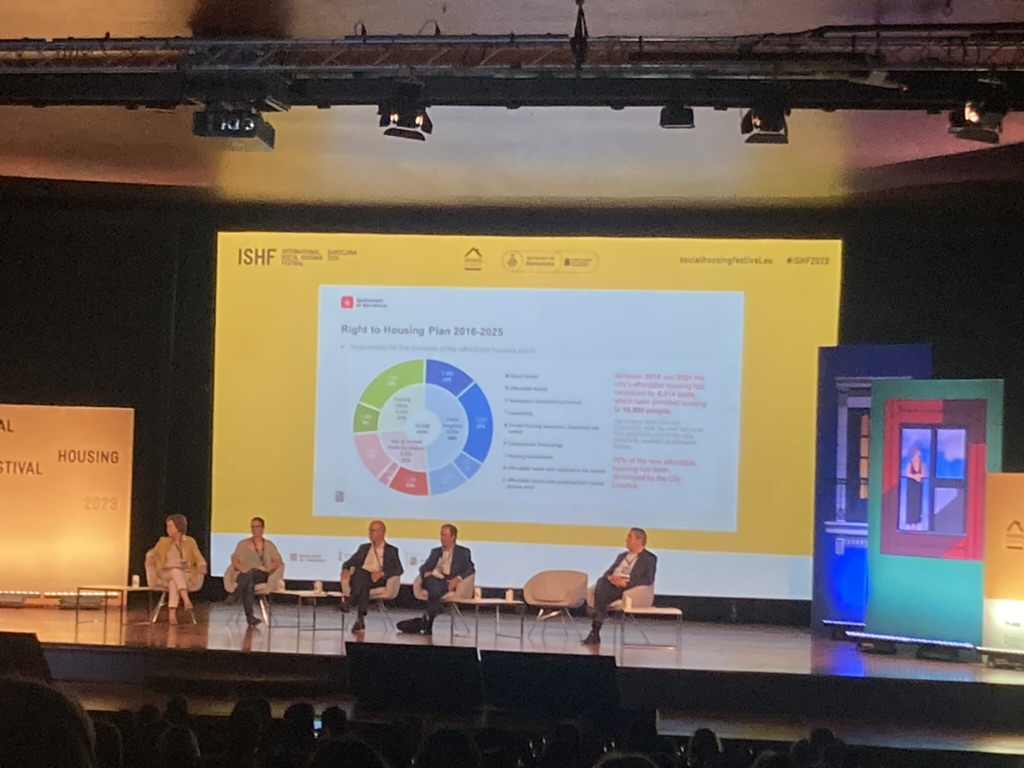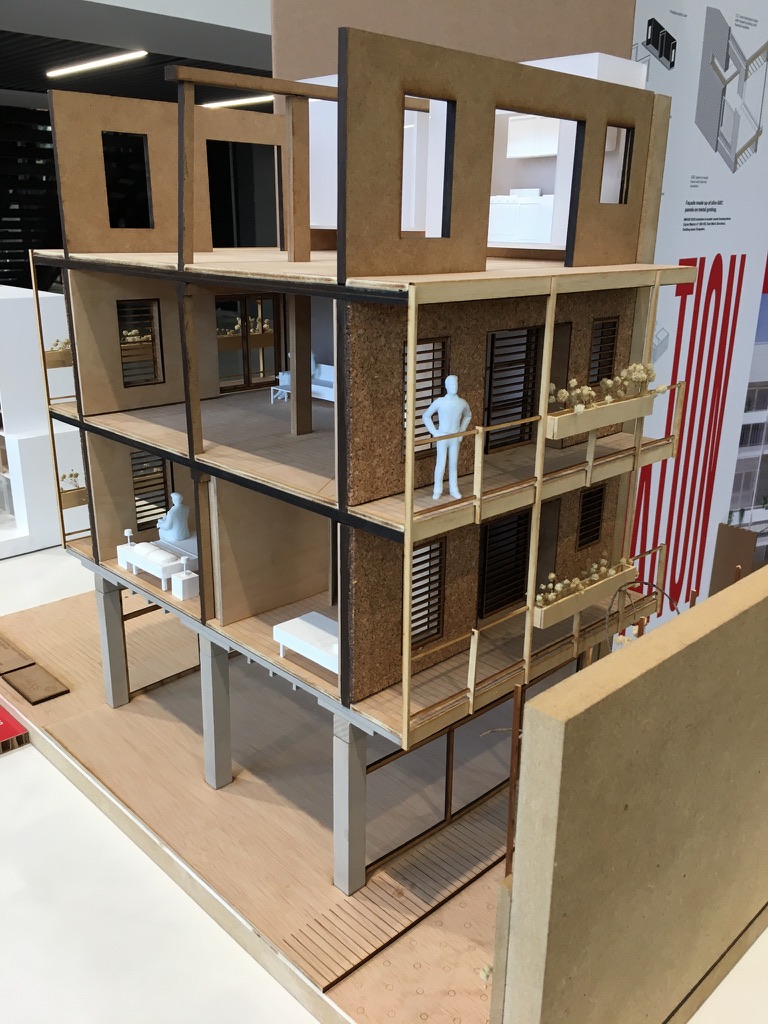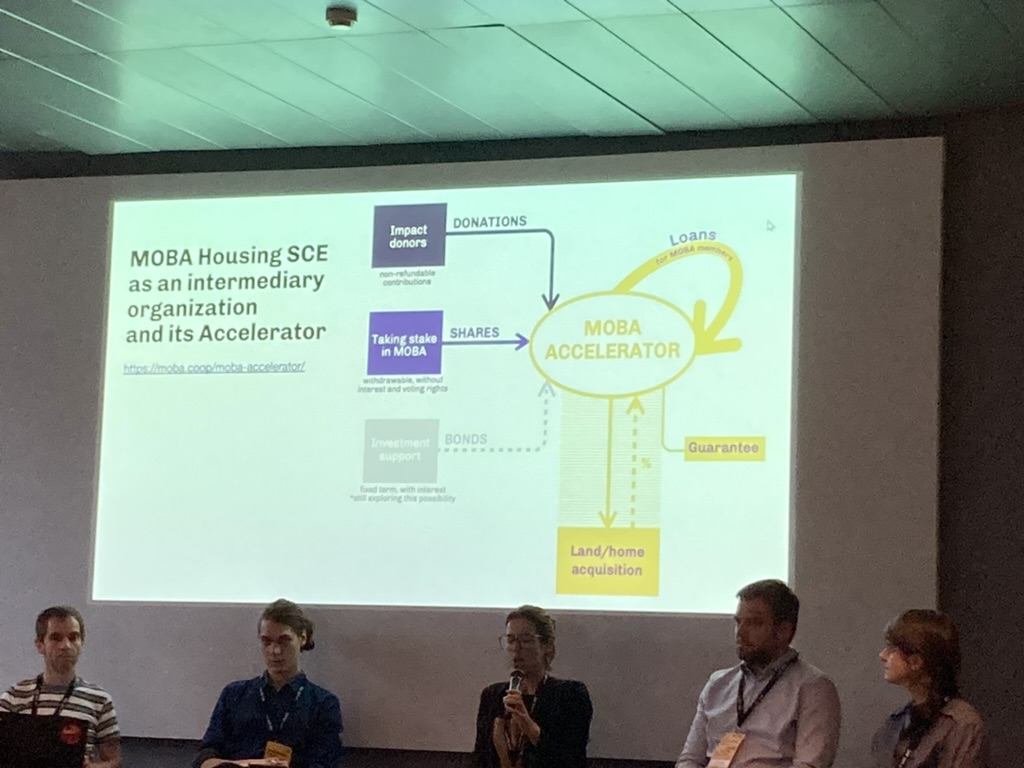Barcelona: City of Hope for Collaborative Housing

Finally catching my breath, I can pen some reflections on the ISHF Barcelona. The first week of June, I joined colleagues from the Community Land Trust Network, and 1500 people from across the world over 3 activity filled days at the International Social Housing Conference. Barcelona and its people were the star of the show whilst the conference provided plenty of opportunities to deep dive into the story of change in housing policy visiting projects and hearing from activists, investors, policymakers, and politicians. I left with a heart full of hope that there are brilliant people collaborating and another world is possible. One highlight was seeing co-ops, cohousing and land trusts taking a central role within the city-wide policy to address affordable housing issues.
Earlier in the week I was challenged by an accomplished academic who asked, “after all these years why hasn’t community led housing mainstreamed in the UK?”
In response I would categorise my take-aways from Barcelona for a successful community led housing sector in the UK into three categories
1) mission-led leadership,
2) creating healthy ecosystem for change and
3) collaborative intermediaries.
Leadership - catalysing expectations

The city’s Mayor, Ada Colau Ballano, came to office 8 years ago as a committed anti-eviction campaigner. She had a mandate for creating a dynamic programme of action on affordable housing. Under her leadership Barcelona City Council’s has boldly created a new paradigm in which housing as a human right is its guiding principle from which all else follows. The city faces multiple housing challenges. Some are local and others international in nature. Each year the charisma of the city attracts millions of visitors (like me) which incentivises landlords and investors to exchange use of much needed rental housing for short-term lets and Airbnb. Other problems have global drivers as the UN Special Rapporteur on Housing Leilani Farha, well known for her 2019 film Push explained. She argues with evidence that financial markets have become untethered from the interests of national boundaries, meaning housing, rather than being a human right and foundation for a healthy society, has become commodity owned by powerful predatory actors. Citizen led action is a key to redressing the power imbalance in housing markets. She was speaking at the launch of the new European Community Land Trust Network which she hailed a important “power move”.
Given the Mayor’s background it is no surprise to hear that they say they are the first administration to tackle private rentals and have a municipal Anti-Eviction Unit which takes the role of mediator between courts, property agents and affected families. The unit handles between 50 and 60 cases a week on average, with nine out of ten able to be suspended thanks to the work done by the service along with social movements. In extreme cases the council holds the right to take back a property if mediation on evictions doesn’t work.
Ecosystems thinking: market shaping not fixing

Barcelona’s response to their housing crisis has been to acknowledge that housing is a wicked problem requiring systemic thinking and multiple solutions delivered by multiple actors (Link). They have drawn inspiration from far and wide, including academic superstar Mariana Mazzucato based at UCL in London (link) and Shane Phillips work on The Affordable City (link). Their strategy is to move from market fixing to market shaping with government seen as an entrepreneurial actor (link).
Consensus and collaboration around Barcelona’s mission-led housing strategy was regularly emphasised. For example, the delivery of new housing is split equally between public, private, and non-profit actors and outcomes focused finance mixing loans and there is talk of the city-wide community land trust. The policy aims to ensure affordability, diversity, and choice in housing provision. As a result, co-ops, cohousing and land trusts in the city-wide housing strategy have a powerful role to play in Barcelona’s strategy. For CLH leaders in the UK this is eye-popping. Government support has been welcome but off and on. The land that is made available for CLH is often small scale and deemed difficult to develop. Only limited mainstream finance is available, and that which is offered at interest rates priced above most local authorities, housing associations and developers. Some leading-edge charitable trusts and social investors are testing with water with CLH but tend to pick and choose which types of CLH they prefer or can work with, distorting the potential of the movement. This also has effect of pitting one form of CLH against another in bids for funding and partnership or social rental housing vs intermediate housing vs mixed tenure developments. It is in short, a difficult environment or ecosystem to grow. Barcelona paints a picture of what a healthy ecosystem with a balance between private, public and community led sectors might look like.
Collaborative housing intermediaries rise!

Several of us within CLH have been reflecting upon new strategies for the movement over the last year. One realisation as outlined by my colleague Tom Chance in his blog last week (link) has been that our focus on supporting a movement of purely grassroots, locally led ventures is proving to be a very difficult way to create scale. Sure, we have many innovative, inspirational, and pioneering cohousing schemes for example, but they tend to achieve their aims in one community and the whole process begins from scratch somewhere else. Barcelona offered a picture for community led housing with government actively seeking to make co-operative/cohousing intermediaries part of their core strategy for affordable housing.
One inspiration for me is was Sostre Civic (link) and I had chance to visit one of their projects – Princesa 49 (pictures above).
The co-operative was founded in 2004 and is Catalan’s first. They council can transfer housing to the co-operative for right to use to develop and manage on leases of 75-99 years. They currently have 1000 members signed up hoping for housing, 17 projects in their portfolio with 6 already in existence and 86 homes in use. At Princesa 49 they renovated the building to create 5 flats with a common room and rooftop terrace with outstanding views. The flats are of various sizes with 3 singles, a couple and a family living there. The residents pay 9000 euros to have a stake in the housing and then pay monthly rent thereafter. Barcelona’s policy includes paying attention to social as well as affordable intermediate housing. Residents at Princesa 49 included professionals on middle incomes. Residents manage the decision making regarding Princesa 49 with the co-op in support as a managing agent. However, the co-op is just one of many within the Sostre Civic portfolio and the residents have a voice on the wider decision-making platforms as well.
To apply, you can’t already own property and household incomes can’t be more than 153,000 euros a year. The development cost around 350,000 euros to renovate. Sostre Civic must pay its lease regularly to the council for right to use and if it fails to do so five times then the council can step in and take over.
Sostre Civic provides a good example of the role a dedicated, co-op value led intermediate can play. Potential residents seem more than happy to form part of a co-op/cohousing scheme once a site and development is ready. The wider co-operative membership is available to comment on plans and proposals and Barcelona appears happy to make land available and allow the co-operative to manage its allocation policies.
New finance intermediaries needed

It was interesting to hear from MOBA housing provides a similar co-operative model across countries in south and central Europe. They are now creating an accelerator to attract finance (link) that uses loans to acquire buildings or construction land and construct or renovate these premises. They are unable to provide revenue funding to cover the costs of getting proposals through to planning permission which is the one area we have found essential in the UK yet hard to fund.
Bringing it all back home to the UK
Working with colleagues Tom Chance and Blase Lambert we are keen to find new solutions to financing CLH to scale. To take the movement forward we need finance that includes the investment readiness work – revenue to get through to planning permission matched with a range of capital, patient, recyclable funds priced at levels comparable with councils and housing associations. Post conference the work now begins. Can public funding be used over a long-period to leverage in finance from the mainstream as guarantees, land-bank funding, equity? Particularly if this finance was “CLH” neutral – ie not weighted to specific models. This can create a supportive and reliable financial ecosystem which could open out the movement. And so, as Barcelona has shown, to tackle something as complex as housing you need multiple solutions applied flexibly, without prejudice towards a particular method. Within a healthy ecosystem that helps us access planning, land, raises awareness, investment, community activism and expertise (PLAICE) community led housing can grow and scale. Hopefully for one or two of my sceptical academic colleagues my reflections from Barcelona can offer some insights as to where we are now in the UK and hope for a better future.
